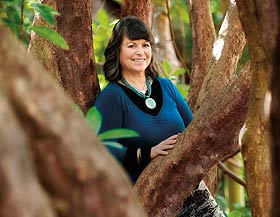
 Dr Heather Devere:
Dr Heather Devere:
Friendships are not necessarily equal, but must be reciprocal – and reciprocity is needed for society to work better."
Friendship in politics can be fraught with difficulties, but it's a concept worth reconsidering.
"For most of the 20th century political friendships have been equated with nepotism and favouritism, which do not fit with the idea of objective democracy," says Dr Heather Devere, Director of Practice at the University of Otago's National Centre for Peace and Conflict Studies.
But now, maybe it is time to revisit the idea of friendship in politics in the hope of building a better society, she says.
Devere outlines her ideas in a chapter of a forthcoming book, Friendship: Practices, Discourses and Semantics of Friendship and Patronage (Vanderhoek and Ruprecht: Goettingan University). She has published widely on issues including peace education, women and politics, women in the media, refugee resettlement, children's rights and the politics of friendship.
There's a huge amount of literature looking at politics and friendship, but it seems there is a gap during the first threequarters of the 20th century when there was very little debate about incorporating friendship into the political sphere."
Western definitions of friendship have tended to contrast it with enmity – such as George W Bush's with us or against us" rhetoric – but that's a limited way of looking at friendship, says Devere.
For some cultures there is no separate word for enemy that does not incorporate the idea of potential friendship and, therefore, the possibility of reconciliation.
Western friendship has its origins in Greek and Roman writings where it is part of politics. It is possible that some of these ideas can be used to reinvigorate contemporary politics by focusing more closely on human elements and human emotions.
Friendships are not necessarily equal, but must be reciprocal – and reciprocity is needed for society to work better. Friendship is a mutual relationship and cannot be one-sided."
Devere says there's now a burgeoning literature on friendship in politics, emerging from concerns from both academics and activists that our current political systems are producing increasing conflict within western societies, between west and east, and north and south, as well as within and between states and other political groups.
As a political scientist I've looked at politics from a number of different perspectives to see how society might be improved so that people are able to live 'the good life'.
Joining the Peace and Conflict Studies Centre enables me to follow my main commitment to study how to bring about more peaceful societies."
Funding
- Aotearoa New Zealand Peace and Conflict Trust
- Albert-Ludwigs University of Freiburg